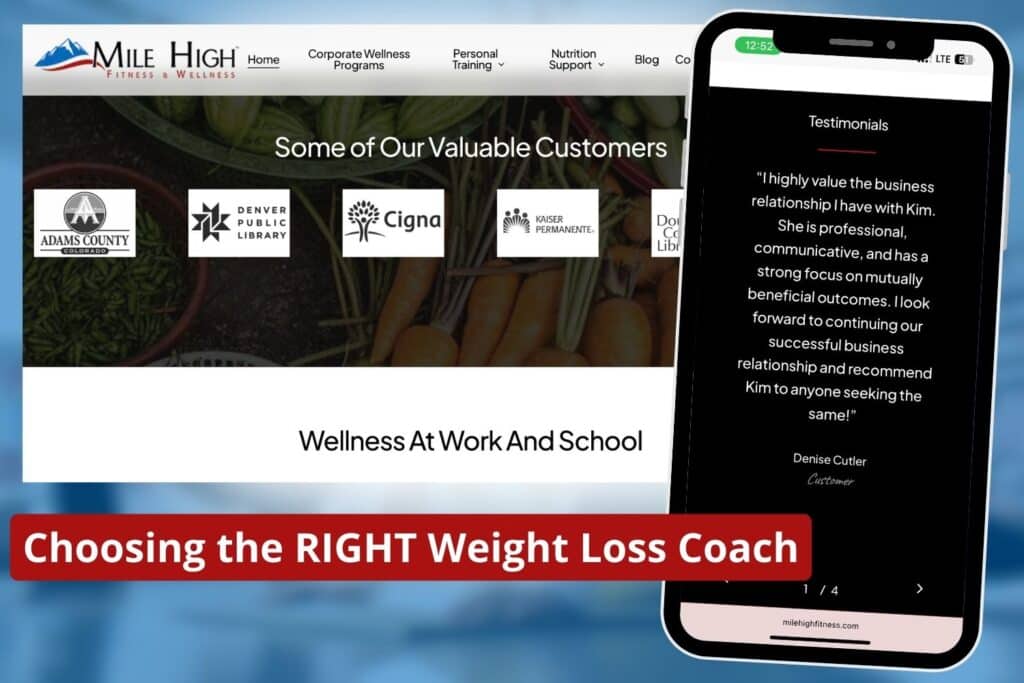Finding the right weight loss coach can be the difference between another failed attempt and lasting success. The right coach helps you with more than just the scale. They guide you through habits, mindset, and lifestyle changes that actually work long term.
This guide will walk you step by step through what to look for when choosing a weight loss coach so you can feel confident in your decision.
What Does a Weight Loss Coach Actually Do?
A weight loss coach is more than someone who tells you what to eat or how to exercise. They are there to help you:
- Build healthier habits you can keep for life
- Stay accountable with check-ins and progress tracking
- Balance areas like sleep, stress, and nutrition that impact results
Unlike a personal trainer who often focuses on workouts or a nutritionist who focuses only on food, a weight loss coach looks at the big picture. Their goal is to create a plan that fits into your life, not the other way around.

How Do You Know If a Weight Loss Coach is Qualified?
Not all coaches have the same background. When reviewing your options, here’s what to check:
- Certifications and training – Look for credentials from recognized organizations in health, fitness, or nutrition.
- Experience – A strong coach will have a track record of helping clients reach sustainable results.
- Testimonials or reviews – Past client stories give you a sense of their approach and results.
Red Flags to Watch Out For
- Promises of “quick fixes” or rapid weight loss
- One-size-fits-all plans with no customization
- No proof of past success
A quality coach will welcome your questions and be transparent about how they work.
What Approach Should the Right Coach Take?
The best weight loss coaches focus on more than calorie counts. Look for someone who:
- Encourages sustainable changes, not short-term diets
- Helps you manage stress, sleep, and energy levels
- Customizes strategies to your lifestyle and goals
For example, instead of just giving you a meal plan, a strong coach might guide you on how to shop smarter at the grocery store or plan meals that work with your busy schedule.
What’s the Right Fit for Your Personality and Goals?
Not every coaching style works for everyone. Think about what motivates you:
- Do you prefer a structured, data-driven approach?
- Do you thrive with encouragement and accountability?
- Do you need daily check-ins or is weekly support enough?
Some coaches are very direct and goal-focused, while others are more supportive and flexible. The right match depends on your personality and what keeps you moving forward.

How Much Should a Weight Loss Coach Cost?
Prices can vary widely depending on experience, services, and whether sessions are online or in person. On average:
- Group coaching: $50–$150 per month
- One-on-one coaching: $200–$500+ per month
It is important to view coaching as an investment in long-term health. A good coach should help you build skills and habits that last long after your time together.
Be cautious about hidden costs such as mandatory supplements or upsells. A trustworthy coach will be upfront about pricing.
Signs You’ve Found the Right Weight Loss Coach
Here are a few clear signs you’re in the right place:
- They create a plan tailored to your lifestyle
- Progress is measured beyond the scale (like energy, sleep, or strength)
- You feel encouraged, not judged
- The focus is on long-term success, not quick wins
When you work with the right coach, you’ll feel supported and confident, not overwhelmed.
Related Questions
Do I need a weight loss coach or a personal trainer?
A trainer focuses mainly on workouts, while a weight loss coach covers the bigger picture: nutrition, habits, stress, and accountability. Many people benefit from having both.
How long should I work with a weight loss coach?
It depends on your goals. Many clients work with a coach for at least 3–6 months to build lasting habits.
Can online weight loss coaching be as effective as in-person?
Yes. Online coaching is often just as effective because it focuses on accountability and support. It also gives you flexibility with scheduling.
What’s the difference between a weight loss coach and a nutritionist?
A nutritionist focuses strictly on diet. A weight loss coach may include nutrition but also add accountability, lifestyle guidance, and mindset support.
Conclusion
Choosing the right coach is about more than credentials. It is about finding someone who understands your needs, supports your lifestyle, and guides you toward lasting change.
If you are ready to take the next step, start by writing down your goals and asking a few coaches about their approach. The right fit will feel supportive, realistic, and tailored to you.
Ready to see if coaching is right for you? Reach out today to schedule a consultation and explore how a weight loss coach can help you create a healthier, more confident future.



